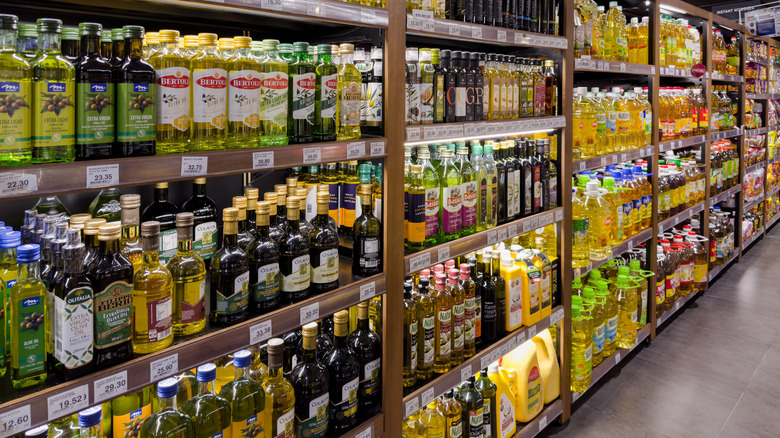The Type Of Cooking Oil Bobby Flay Uses '98% Of The Time'
Time and time again, we're told that olive oil is the end-all, be-all of cooking oils. Of course, we all love our EVOO — what's not to love about its rich, peppery flavors, nutritional benefits, and velvety texture? So it makes sense to assume that most celebrated chefs are also going through this liquid gold with glee and reckless abandon. Not so with Chef Bobby Flay (celebrity chef and owner of several restaurants) whose career took off in the early 2000s, right when the Food Network was dominating American cable TV.
In an interview with Bon Appetit, Flay laid down his laws of the land when it comes to bold, flavorful cooking. From always using an extra-hot skillet for searing meat to dressing a salad just the right way, Flay doesn't hold back when sharing his tricks of the trade, including his favorite cooking oil. Flay explains that "ninety-eight percent of the time, I cook with canola oil. It has a higher smoke point than olive oil and, because it's so neutral, it's not going to change the flavor of what I'm making." He does suggest finishing dishes with olive oil, however. Though his choice may surprise you, there's actually a whole host of reasons why this neutral flavor has its place in the kitchen.
Canola oil vs olive oil
Canola oil is derived from the seed of a canola plant, a rapeseed cultivar that's a member of the Brassicaceae family (which also includes mustard and cabbage). Fun fact, since it was originally developed in Canada in the 1970s, the name is actually an abbreviation of "Canadian" and "oil, low acid." Canola oil fans point out that it handles high-heat situations better than olive oil. Its higher smoke point, around 400 degrees Fahrenheit, makes it ideal for grilling and searing without burning that juicy bavette steak. Unlike coconut and olive oil, there's practically no flavor, allowing your roasted butternut squash to shine through in all its sweet, buttery glory.
If you're on a budget, canola is certainly a more cost-effective oil, particularly if you're using it in large quantities. However, while canola certainly isn't unhealthy in small amounts (containing healthy unsaturated fats), it can't compare to extra virgin olive oil's antioxidants and polyphenols. So, even though Bobby Flay may use canola 98% of the time, that doesn't mean you have to. If flavor and health benefits are a priority, and you're creating more delicate dishes, go Team Olive. If you're frying up a batch of chicken for a large crowd, it's canola's high smoke point and lower prices for the win.

